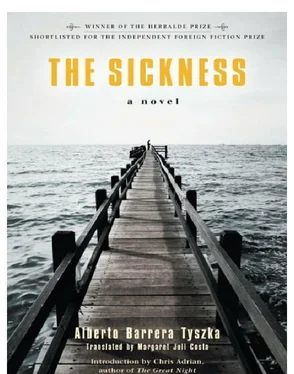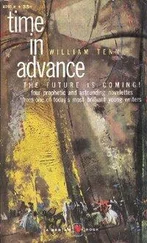“Are the results of the CT scan in as well?”
The radiologist shakes his head and shifts his gaze to the corridor.
“I was told they were being sent direct to you.”
Andrés feels strangely embarrassed, as if both of them were making a tremendous effort not to upset the fragile balance of the moment. He thanks his colleague and makes his way back to his office. No one has told him as much, he hasn’t even seen the X-rays, he hasn’t been shown the results, and yet he knows that his father has cancer.
Why do we find it so hard to accept that life is pure chance? That is the question Miguel always asks before any operation. There they all are wearing green gowns, gloves, and surgical masks; the white light of the operating room seems to float on the cold air-conditioned air. And then Miguel picks up a scalpel, looks at Andrés, and asks: “Why do we find it so hard to accept that life is pure chance?” Some of the nurses dislike this as a prelude to an operation. Perhaps they realize that it’s not exactly a good way to start, almost a prior justification in case anything should go wrong. Andrés is sure this isn’t so, for he knows Miguel well; they’ve been friends since they were students. There’s no cynicism in that question. It seems, rather, an expression of self-compassion, a kindly prayer; a way of recognizing the limits of medicine in the face of nature’s infinite power or, which comes to the same thing, the limits of medicine in the face of illness’s infinite power.
As soon as he goes into his office, as soon as he closes the door, he begins to tremble. He feels as if, suddenly, his body were breathing differently, making different sounds and movements, as if he bore inside him some helpless, stumbling creature, as if he were giving birth to a disaster. He hurriedly makes his way over to the chair behind the desk and sits down. He’s still holding the envelope. Inside are two chest X-rays. Bluish photos, harsh, sharp transparencies. His father’s body transformed into a blurred drawing in which, however, death is all too cruelly clear. Andrés feels afraid, even though this isn’t a new fear: it’s been there for years, stalking him. It must be the same fear which, for no reason and yet so often, leaps out at him from his own shadow. It’s the anxiety that weighs on his chest some nights, preventing him from sleeping. We’re probably all born with such a fear, which is as vague as it is overwhelming. It wanders about inside us, not knowing where to go, but never leaving us. It prepares itself, trains itself, waiting for the right moment to appear. It’s an omen, a voice that doesn’t quite know yet what it has to tell us. But it’s there, an indecipherable, incomprehensible sound, an insistent drip-drip, an alarm call. He’s been hearing it for years, running away from it, trying to frighten it off, but never succeeding. Now, that anxiety has taken on a shape: the face of the radiologist, with its evasive, resigned expression. Andrés has seen it too many times before. He himself must have worn the same expression on more than one occasion. It’s the illustration that accompanies a bad diagnosis, the first installment of an expression of condolence. Is he ready for this? He’s not sure.
The phone rings. It’s Karina, his secretary. She tells him his father is on the line again, asking if he can speak to him.
“Am I so ill that you don’t even want to talk to me?”
This is his father’s opening line. Delivered in a jokey tone, of course. Andrés recognizes the nervousness that lies behind. It’s a classic strategy. Many patients opt to use it, positioning themselves on a thin line where everything is simultaneously half jest and half serious; they try to act normally, when, in fact, they’re terrified and haven’t stopped thinking, not even for a second, about the possible result of their tests. They’ve spent hours pursued by the fear of mortal illnesses; they’ve felt an odd twinge in every movement they make; they’ve seen suspicious blotches where before they saw only skin. Then they go to the doctor, trying to look strangely natural: they smile, but appear to be on the verge of tears. They ask questions like the one his father has just asked.
“I didn’t phone you earlier because I’ve only just seen the results of your tests,” Andrés says.
“And?”
“In principle, everything’s fine,” he says, touching the sealed edge of the envelope.
“In principle? What the hell does that mean, Andrés?”
“Calm down, Dad. I’m telling you that you’re fine.’
“You’re telling me that, in principle, I’m fine: that’s rather different.”
Andrés is perfectly familiar with this stage too. Generally speaking, patients need to squeeze every word, wringing out its most precise meaning, with every nuance washed away. They want to clear up any doubts, even about punctuation. A patient always suspects that he’s not being told the truth or at least not the whole truth, that some information is being withheld. That’s why they insist on delving desperately into everything, even language. In this case, though, his father is right. Andrés said “in principle” because he hasn’t yet looked at the X-rays. Why doesn’t he take them out now, why doesn’t he open the envelope and study them? What is stopping him from looking at those results?
The radiologist’s face hangs like a balloon in his office. Hospital corridors tend to be full of such balloons. They drift slowly through the air, identical, tenuous bits of plastic on which are painted frowning brows, grave mouths, sober looks: all the outward signs of helpless resignation. It’s a ceremony, a clinical protocol. Hospitals are places through which one passes: temples to farewells, monuments to partings.
“I said ‘in principle’ because I still don’t have all the results. The ones I’ve just been given are fine.”
“Which means that. .”
“That there’s nothing to worry about, Dad,” Andrés says, interrupting him, already embarrassed. He can’t stand lying for any length of time. “Go out for a walk, have a coffee somewhere with your friends. Everything’s fine, really.”
“Are you sure?”
“Yes, I’m sure.”
There is a brief silence. A tense, unbearable pause. Andrés wants to hang up. He can sense that his father is still uncertain, still in doubt. He can imagine him in his apartment, sitting on the arm of the green sofa beside the phone, gripping the receiver, thinking. Suddenly, Andrés feels as if he were poised above a chasm of nothingness, a precipitous drop. They’re suspended for a moment not in silence, but in the void, until:
“You wouldn’t lie to me, would you?” His father is speaking from his very bones, in the harsh but intimate voice with which all bones speak. “Andrés,” he goes on, “if there was something seriously wrong with me, you wouldn’t ever hide it from me, would you?”
Andrés has a hedgehog on his tongue. His throat fills with pineapple rind. Despite himself, his eyes well up with tears. He’s afraid his voice might fail him. He makes a huge effort to speak.
“I would never deceive you, Dad,” he says at last, with as much conviction as he can manage.
“That’s all I wanted to hear. Thank you.”
Dear Dr. Miranda,
I trust you will remember me. It wasn’t easy to get hold of your e-mail address. If you knew what I’ve been through to find it! But that’s another story. What matters is that I’m here now, writing to you. Not that I like the fact. I’ve never felt com fortable writing. It’s not me, it doesn’t feel right, I don’t know where to put the words or what to say. But in a way, circumstances are forcing me to write. I have no other option.
I need to see you urgently, Doctor. I’m desperate. For three months now, something very strange and mysterious has been going on. When I call your office, I’m told you’re not in or can’t come to the phone. If I ask to make an appointment, the person at the other end says “No,” she can’t do that. And she won’t explain why either. I’m sure you know nothing about this situation, nothing at all. You would never treat me like that, but if that’s the case, who is responsible for all this? And why?
Читать дальше












